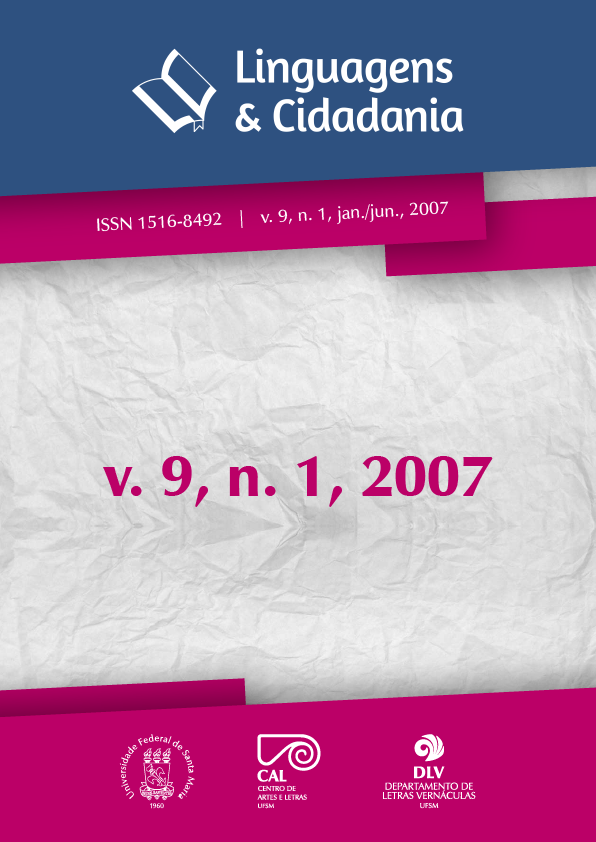A prática de leitura em L2 em cursos técnicos e universitários
DOI:
https://doi.org/10.5902/1516849228300Parole chiave:
Reading, Cognition, Learning, StrategiesAbstract
Reading is an inter-active ability made up of essential elements involving the meaning of a text, enabling the readers to develop their mental faculties by working on their expectations, predictions, adjustments and negotiations. As a result, it provides personal and professional improvement to any academic purpose. The “English for Specific Purposes” is a methodological approach widespread in most universities and technical schools all over the country. This approach is specially committed to the development of foreign language reading skills. Its main purpose is to facilitate students’ reading process in second language. Due to the relevance of English as a second language and the increasing need of expanding the reading performance in different areas of study, this article is focused on the importance and contributions of reading strategies for an effective learning. It presents a brief overview of some cognitive aspects of reading, discussing the teachers’ role while planning and managing their reading classes. It also comes up with some relevant elements and pre-reading strategies that can be very effective to the development of students’ reading process to an autonomous and successful language learning.Downloads
Riferimenti bibliografici
BAMBERGER, Richard. Como Incentivar o Hábito de Leitura. São Paulo: Ática, 1997.
CAETANO, Santa Inês Pavinato. O Ensino de Literatura: Deficiências e Alternativas para Mudar Paradigmas. IN FLÔRES, Onici Claro (Org.). O Ensino de Língua e Literatura: Alternativas Metodológicas. Canoas: Ed. ULBRA, 2001, p. 97-107.
DUBIN, Fraida, ESKEY, David E. & GRABE, William. Teaching Second Language Reading for Academic Purposes. Addison-Wesley publishing Company, 1986.
FARNHAM-DIGGORY, Silvia. Cognitive process in education. Nova York: Harper Collin, 1992.
GRELLET, Françoise. Developing Reading Skills. 14.ed. Cambridge: Cambridge University Press, 1994.
JANZEN, Joy. Teaching Strategic Reading. IN RICHARDS, Jack C. & RENANDYA, Willy A. (Eds.). Methodology in Language Teaching: An Anthology of Current Practice. Cambridge: Cambridge University Press, 2002, p. 287-294.
MAXWELL, Leila J. & MARTINS, Sandra E. C. Reading in a Foreign Language (English) Based on an ESP Approach. BRAZ-TESOL, July 13-16, 2000, p. 155-160.
MUNHOZ, Rosângela. Inglês Instrumental: estratégias de leitura, módulo I. são Paulo: Textonovo, 2001.
NUNAN, D. Designing tasks for the communicative classroom. Cambridge: Cambridge University Press, 1989.
NUTTALL, Christine. Teaching Reading Skills in a Foreign Language. London: Heinemann Educational Books Ltd, 1983.
PHAN, Ngan. Effective Reading. Disponível em: http://www.asian-efljournal.com/pta_october_06_np.php. Acesso em: jun. 2007.
RAOF, A. H. Abdul & MD. YUSOF, M. A. ESP Project Work: Preparing Learners for the Workplace. Disponível em: http://www.asian-efljournal.com/March06_aar&amy.pdf. Acesso em: jul. 2007.
RICHARDS, Jack C. & RENANDYA, Willy A. (Eds.). Methodology in Language Teaching: an Anthology of Current Practice. Cambridge: Cambridge University Press, 2002.
VICENTE, Márcia L. Approaches to the Teaching of Reading in English Present in some Recent Brazilian Textbooks. X Encontro Nacional de Professores Universitários de Língua Inglesa (ENPULI): Departamento de Letras da PUCRJ, 30 de Julho – 03 Agosto, 1990, p. 5.8.1 – 5.8.20.






